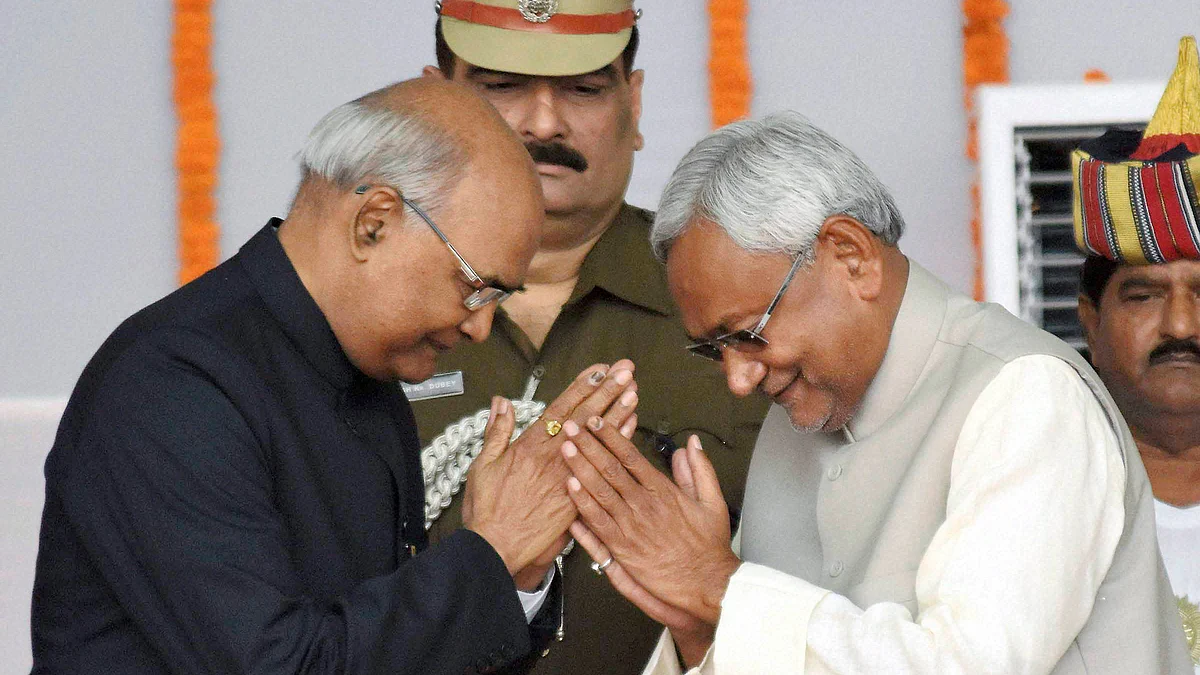Yes, Nitish Kumar Blundered By Backing the NDA on Kovind
After his decision of backing the NDA candidate for President, is Nitish the man to steer the opposition in 2019?

advertisement
Lalu Prasad Yadav is right. Bihar Chief Minister (CM) Nitish Kumar has blundered in announcing support for the National Democratic Alliance’s (NDA) presidential candidate – and not only because the joint opposition candidate is a Dalit daughter of Bihar.
Nitish’s decision is baffling because talk of a joint opposition candidate was initiated by Nitish himself. More importantly, it is unlikely to offer any him political advantage. In fact, it could end up weakening his position in his own home state, alienate him from friendly parties, and damage chances he may have fancied of emerging as a viable consensus prime ministerial candidate against Narendra Modi in 2019.
‘Mahagathbandhan’ in Trouble?
One view suggests that Nitish broke ranks on the presidential election to convey his frustration with the time the opposition was taking to identify a consensus candidate. If that indeed is the case, Nitish clearly isn’t the man to steer the joint opposition in 2019.
If the idea is to buy peace with the Bharatiya Janata Party (BJP) amidst recent corruption charges against alliance partner Rashtriya Janata Dal’s (RJD) first family and keep the RJD on the tenterhooks, it is likely to backfire spectacularly. The BJP, given Bihar’s electoral importance and Narendra Modi and Amit Shah’s no-prisoners-taken political style, is likely to soften only temporarily if at all – especially since it doesn’t need Nitish’s support to swing the presidential election.
Plus, from the 2019 perspective, upsetting Lalu risks losing friends in the opposition and fanning long-held doubts about Nitish’s anti-BJP credentials.
Choosing Between BJP and RJD
Remember that every important position Nitish has held between 1998-2014 has owed to an alliance with the BJP. Sooner or later, in a reminder of the perils of straddling two stools, Nitish may just find himself in the cross-hairs of both the BJP and the RJD.
It is entirely possible that Nitish sees merit in siding with measures that appear in sync with the public mood and hopes to wean away some of Modi’s vote with support for Modi’s more contentious choices. However, those possibilities may not materialise.
The credit for the surgical strikes, demonetisation or a second Dalit president will be Modi’s – Nitish’s endorsement for them can, at best, be a footnote to the propaganda machine’s output. And should these choices backfire in time, the discredit will be as much Modi’s as Nitish’s. Essentially, Nitish will always draw a lesser share of the applause compared to the opprobrium for supporting any of Modi’s acts.
Jitan Ram Manjhi, propped up as a stooge, proved an embarrassment and finally rebelled; the ill-timed divorce with the BJP saw the Janata Dal-United (JD-U) being decimated in the 2014 parliamentary elections; and the mystifying needling of the RJD supremo and humouring of the BJP even before the recent round of corruption charges against the Lalu clan has only undermined his own government and, notably, earned little reprieve from the BJP.
Playing to both sides of the gallery is a timeless political tactic, but it may not work for Nitish in the current circumstances. The cheerleaders of the ascendant team already have a messianic figure to egg on and won’t look beyond him, and the underdogs can hardly be expected to view overtures to the other side kindly. Nitish might find himself shunned by one side, distrusted by the other. It doesn’t augur well for someone who hasn’t won a state election without piggybacking.
(Manish Dubey is a policy analyst and crime fiction writer and can be contacted @ManishDubey1972. This is an opinion piece and the views expressed above are the author’s own. The Quint neither endorses nor is responsible for the same.)
(At The Quint, we question everything. Play an active role in shaping our journalism by becoming a member today.)